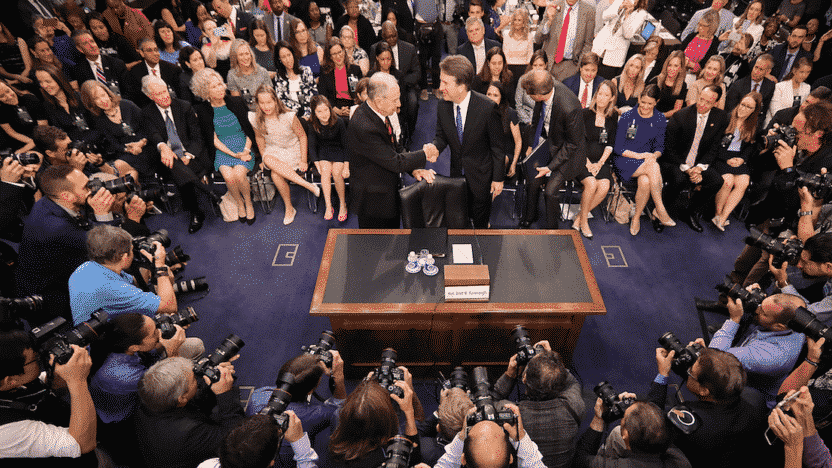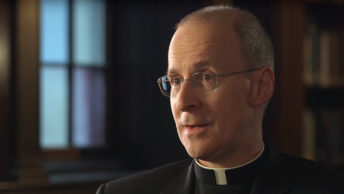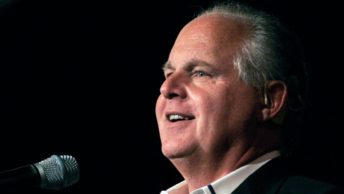On July 9, 2018, President Trump announced that he was nominating Brett Kavanaugh to be a justice on the Supreme Court, replacing the retiring Anthony Kennedy. On the same day, the editors of America, the official magazine of the Jesuits in the United States, endorsed his candidacy. In the title of the endorsement editorial, one reads, “Anyone who recognizes the humanity of the unborn should support the nomination of Judge Kavanaugh.”
The crux of the editorial was that, since Kavanaugh is a textualist when dealing with Constitutional issues, perhaps his vote will overturn Roe and return the contentious abortion issue back to the states. The editors hope that once abortion is outside the purview of the Supreme Court, then pro-life Catholics can focus on other important issue such as euthanasia, the death penalty, a “sane immigration policy” (whatever that means), and a “medical safety net for expectant mothers” to dissuade them from killing their unborn children.
But that was then. This is now. On September 27, 2018, after the testimonies of Dr. Christine Blasey Ford and then Judge Kavanaugh, the editors of America changed their minds. In a new editorial, the magazine is calling for President Trump to withdraw the nomination.
Is this because the editors believe Ford is telling the truth and Kavanaugh is lying? Well, no, not exactly. They do admit that if her testimony could be proven true, then Kavanaugh certainly should not be seated on the Supreme Court. But they also admit they have “no special insight into who is telling the truth.”
However, they then write an amazing sentence:
But even if the credibility of the allegation has not been established beyond a reasonable doubt and even if further investigation is warranted to determine its validity or clear Judge Kavanaugh’s name, we recognize that this nomination is no longer in the best interest of the country.
This sentence shows a serious ignorance of the law. The term “reasonable doubt” does not apply to an allegation. According to Barron’s Law Dictionary, an allegation is “an assertion of fact; the statement of the issue which the contributing party is prepared to prove.” (italics mine) An allegation is not to be judged by a “reasonable doubt” standard. An allegation must have evidence to prove its validity.
The reasonable doubt standard is used in jury instructions. Again, in Barron’s, we read, “in a criminal trial . . . innocence is to be presumed unless guilt is so clearly proved (italics mine) that the jury can see that no ‘reasonable doubt’ remains as to the guilt of the person charged.” Thus, the burden for Ms. Ford is to provide actual proof that Judge Kavanaugh attempted to rape her when they were both in high school. Without such proof, her allegation means nothing.
Now don’t get me wrong, America has every right to do what they want to do. If they choose to withdraw their endorsement, so be it. But what is intriguing is the reason for doing so.
The editors spend a lot of words lamenting the fact that nomination hearings have become a fight over policy issues and not about a nominee’s experience and character. And, unfortunately, Judge Kavanaugh’s hearing has “become a referendum on how to address allegations of sexual assault.” And this referendum changes everything.
Now wait a minute. Did the Republicans make these hearings a referendum on sexual assault? Did Judge Kavanaugh make them a referendum on sexual assault? No and no. The Democrats used Ms. Ford and her unverified allegation to make it a sexual assault referendum. Let’s not forget that Senator Feinstein had Ms. Ford’s allegation for nearly two months. The proper procedure would have been to immediately share it with Chairman Grassley and then to forward it to the FBI. At that point, the FBI would have looked into the matter. Ms. Ford’s identity could have been protected, and the drama of last Thursday could have been avoided altogether. But, instead, Feinstein leaked the letter containing the allegation to the press for the single purpose of destroying Judge Kavanaugh’s reputation, and, by doing so, keep him off the bench.
But there’s more. The America editors summarize their endorsement withdrawal with these almost laughable two sentences:
[The hearing] now involves the symbolic meaning of his nomination and confirmation in the #MeToo era. The hearing and the committee’s deliberations are now also a bellwether of the way the country treats women when their reports of harassment, assault and abuse threaten to derail the careers of powerful men.
Which powerful men are the editors referring to? Well, I guess we can assume at least one of them is Judge Kavanaugh. Again, without evidence of a crime, and with a politically correct mindset, the editors have basically implied that Judge Kavanaugh is guilty of being, well, a powerful man and thus, unqualified to become a Justice of the Supreme Court, and, by extension, probably guilty of being a sexual predator.
The America editors apparently care more about placating the #MeToo crowd than standing up for a practicing Catholic who has lived an exemplary life. They show no concern for the despicable tactics of the Democrats and ignore the incredible damage perpetrated upon Judge Kavanaugh and his entire family. So much for their desire to overturn Roe.
If there is any silver lining for Judge Kavanaugh, it must be that practically no one pays attention to the Jesuits or their magazine–and now you know why.









Another comment from a reader: I just read “Jesuit Nonsense.” Bravo Tom Addis. His points are perfectly on target. And his last line delivers the coup de grâce to the heart of Jesuit arrogance. I hope Brett Kavanaugh reads this essay. It will provide a much-needed salve to his undeserved wounds.
What on earth has happened to the Jesuits? Their schools have become an abomination and any practicing Catholic who sends their children there can expect their kids to leave the Church. I’ll pray for them, but no support of any kind.